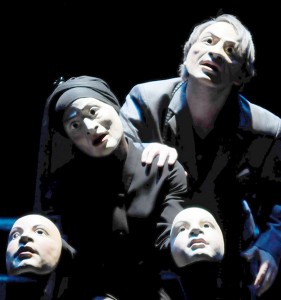Herakles applies modern practices to ancient play
To understand the present, look to the past.
The ancient Greeks saw war in all of its dehumanizing ferocity. In 416 BCE, Euripides wrote Herakles to parallel civil wars in Greece, contrasting the madness of war with the madness of Hercules (Herakles), the demigod son of Zeus.
The New York-based Aquila Theatre production of Herakles, a Visions and Voices: The USC Arts & Humanities Initiative event on Tuesday at Bovard Auditorium, demonstrates the connection to war in the bluntest light through talented actors and the stories of real-life veterans.

The mask · Though authentic, the tragic masks used in the modern adaptation of Herakles detract from the performances and play overall. - Photo courtesy of Visions and Voices
Thebes has erupted: Lycus (Brian Delate, also playing Herakles) has overthrown Creon, the father of Megara (Michele Vazquez) and father-in-law of Herakles. To prevent Herakles’ children from taking future vengeance, Lycus has sentenced them to death, along with their mother and paternal grandfather Amphitryon (Richard Sheridan Willis). The demigod himself has disappeared into Hades to nab Cerberus, the last of his 12 labors. When Herakles finally rides in to save the day, the always bitter goddess and stepmother Hera sets a wave of insanity upon him, which ends with the murder of his family.
The Aquila Theatre adaptation strips Herakles down to its bare bones. The chorus has vanished, the set is sparse and the actors’ faces are frozen in classical theater masks. In between scenes, there are video clips of real-life military veterans who reflect on their time during and after their service.
This production is part of Aquila’s Ancient Greeks/Modern Lives project, a veteran-centered program that stages readings of Greek plays across the United States.
Though Euripides wrote Herakles with the Peloponnesian War in mind, this version bluntly alludes to post-traumatic stress disorder. The connection deepens when soldiers discuss their own alienation upon returning home. As their stories develop, we see their scars and haunted dreams, from an older soldier who saw a bomb go off in a group of children to a young man who poorly hides his trauma behind a liberal use of f-bombs.
Perhaps unintentionally, the use of video also covers up a criticism of the original Euripides play. The show begins with Herakles triumphing over Lycus and saving his family, then going bonkers and slaughtering them — the two halves bear little connection. The video, complete with more war stories and reflections, adds space between the scenes and softens the sudden shift.
The actors also bring the story to life. Vazquez and Delate bring a humanity to Megara and Herakles. Willis shines brightest of the cast — his keening Amphitryon and compassionate Theseus feel completely different, but both dominate their scenes.
Peter Meineck, an accomplished scholar, professor and artistic director of the Aquila Theatre, has translated and adapted Herakles with supreme clarity. Older translations use more poetic tones and mythological references, but the lucidity of Meineck’s translation ensures the audience comprehends every line.
As a poet, Euripides cast his characters in human roles, taking their mythic trappings and winding them around mortal issues such as war and patriotism. Modern warfare easily coalesces with Euripides’ 2,500-year-old work.
The connection with the divine also lends itself well to contemporary interpretations. Many Greek works focused on ruinous flaws, fate, prophecy and order-seeking gods. Here, Herakles does not fall to personal shortcomings and Hera acts out of chaotic spite.
Ultimately, Herakles must accept the destruction of his world, live on and attempt to reestablish meaning. It is a fitting message for modern people scarred by life’s unforeseeable cruelties.
Despite the raw emotion of the performance and video, it could have been handled with more subtlety. Some of the lines, though clear, read with all the nuance of a sledgehammer. A touch more of the Greek lyricism could have provided more contrast.
Meineck has written extensively on the use of masks in traditional Greek theatre. They stand out in Herakles and force the actors to use more intensity in their voices and body language. The masks, however, come with a price — speech sounds muffled and the fixed, open-mouthed expressions border on creepy.
Conversely, the goddess Iris and hero Theseus, maskless, convey a subtler power with expressions, along with movements and inflections. Though it otherwise kept the masks, the creative team did not stick exclusively to authentic Greek staging — the thong-wearing woman who stands as a personification of madness breaks into interpretive dance ushered in by rock music. It’s an interesting scene, but one Euripides probably did not have in mind.
Despite certain downfalls, Herakles combines the truth of the ancient Greeks with the emotions of modern day. Aristotle argued that tragic theatre can provide a form of catharsis. If Meineck and Aquila Theatre can connect with veterans and show they are not alone after the battlefield, they are doing much more than just providing entertainment.
